BUACC3706: Financial Accounting - Accounting Standards Essay
VerifiedAdded on 2022/09/18
|8
|2308
|34
Essay
AI Summary
This essay examines the critical role of accounting standards in the business environment. It defines accounting standards, including GAAP and IFRS, and highlights their significance in promoting transparency, comparability, and reliability in financial reporting. The essay discusses the benefits of accounting standards such as enabling comparison of business operations, ensuring uniformity in accounting processes, assisting auditors, simplifying accounting processes, preventing fraud, and enhancing investor confidence. It also emphasizes the importance of accounting standards in regulatory compliance and protecting investors. The essay underscores the need for businesses to adhere to accounting standards to maintain credibility, attract investment, and ensure the ethical conduct of financial reporting. The essay uses several references to support the arguments. Overall, the essay highlights the far-reaching impact of accounting standards on various stakeholders, including investors, management, auditors, and regulatory bodies, emphasizing their vital role in fostering trust and confidence in the financial markets.
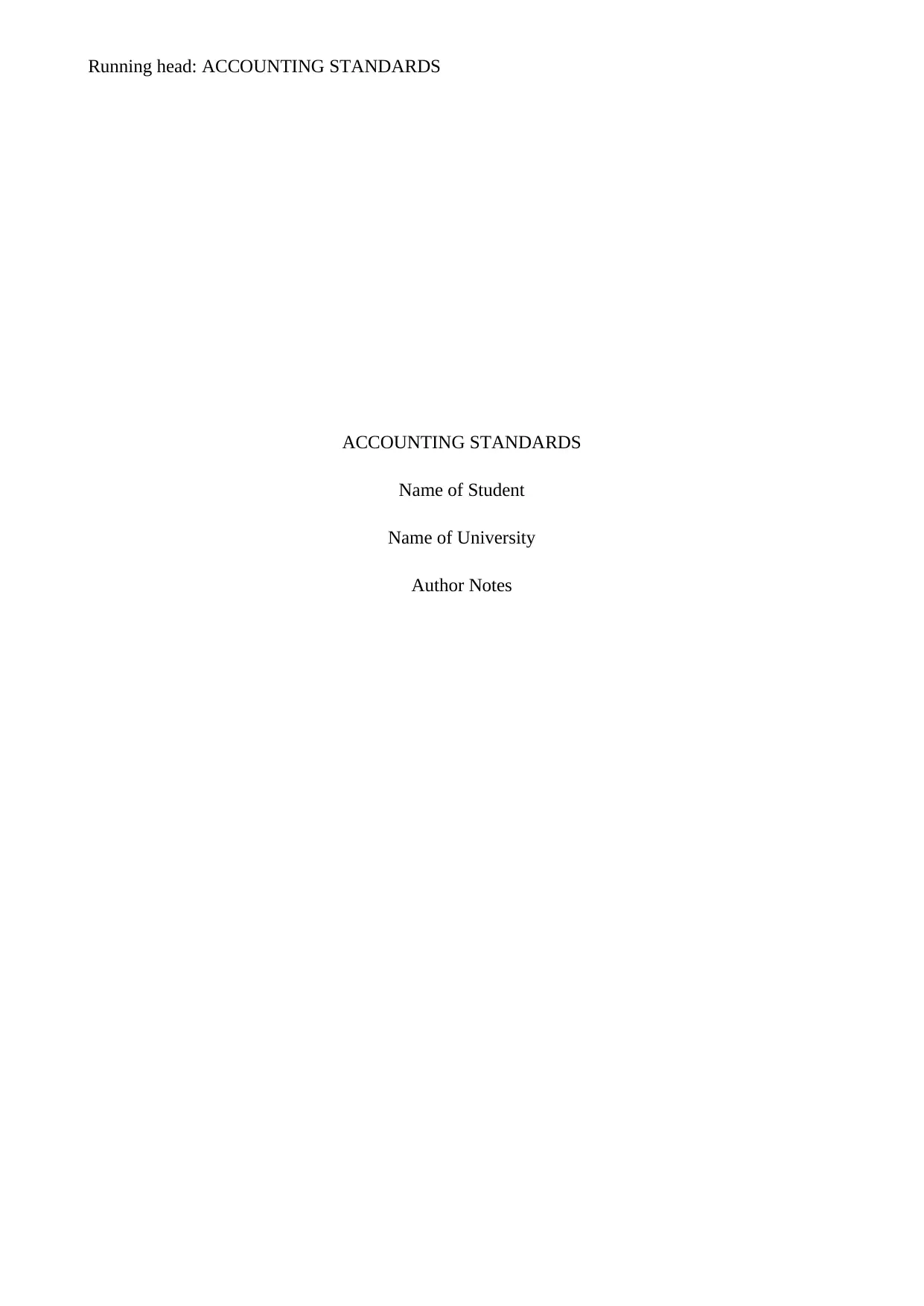
Running head: ACCOUNTING STANDARDS
ACCOUNTING STANDARDS
Name of Student
Name of University
Author Notes
ACCOUNTING STANDARDS
Name of Student
Name of University
Author Notes
Paraphrase This Document
Need a fresh take? Get an instant paraphrase of this document with our AI Paraphraser
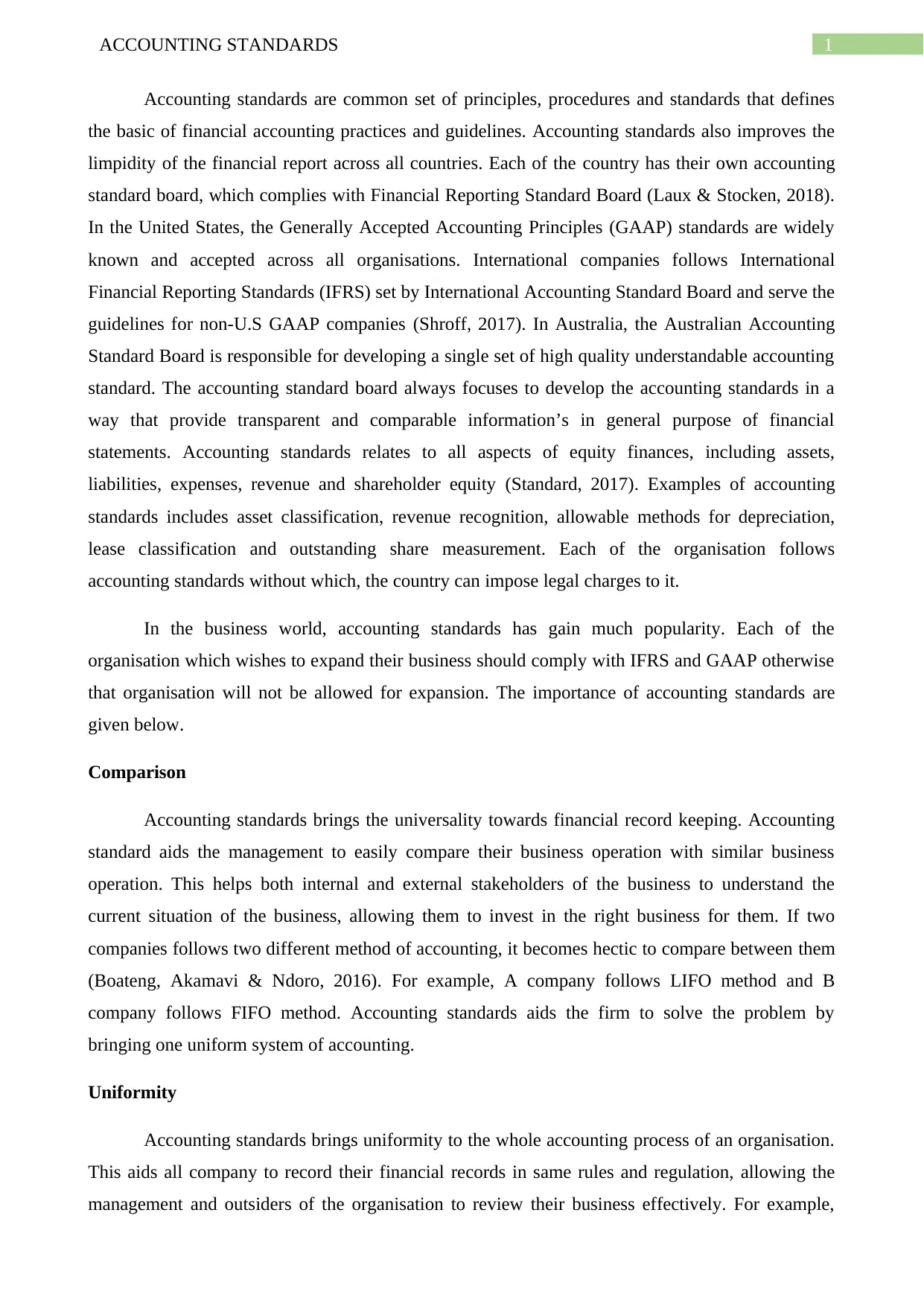
1ACCOUNTING STANDARDS
Accounting standards are common set of principles, procedures and standards that defines
the basic of financial accounting practices and guidelines. Accounting standards also improves the
limpidity of the financial report across all countries. Each of the country has their own accounting
standard board, which complies with Financial Reporting Standard Board (Laux & Stocken, 2018).
In the United States, the Generally Accepted Accounting Principles (GAAP) standards are widely
known and accepted across all organisations. International companies follows International
Financial Reporting Standards (IFRS) set by International Accounting Standard Board and serve the
guidelines for non-U.S GAAP companies (Shroff, 2017). In Australia, the Australian Accounting
Standard Board is responsible for developing a single set of high quality understandable accounting
standard. The accounting standard board always focuses to develop the accounting standards in a
way that provide transparent and comparable information’s in general purpose of financial
statements. Accounting standards relates to all aspects of equity finances, including assets,
liabilities, expenses, revenue and shareholder equity (Standard, 2017). Examples of accounting
standards includes asset classification, revenue recognition, allowable methods for depreciation,
lease classification and outstanding share measurement. Each of the organisation follows
accounting standards without which, the country can impose legal charges to it.
In the business world, accounting standards has gain much popularity. Each of the
organisation which wishes to expand their business should comply with IFRS and GAAP otherwise
that organisation will not be allowed for expansion. The importance of accounting standards are
given below.
Comparison
Accounting standards brings the universality towards financial record keeping. Accounting
standard aids the management to easily compare their business operation with similar business
operation. This helps both internal and external stakeholders of the business to understand the
current situation of the business, allowing them to invest in the right business for them. If two
companies follows two different method of accounting, it becomes hectic to compare between them
(Boateng, Akamavi & Ndoro, 2016). For example, A company follows LIFO method and B
company follows FIFO method. Accounting standards aids the firm to solve the problem by
bringing one uniform system of accounting.
Uniformity
Accounting standards brings uniformity to the whole accounting process of an organisation.
This aids all company to record their financial records in same rules and regulation, allowing the
management and outsiders of the organisation to review their business effectively. For example,
Accounting standards are common set of principles, procedures and standards that defines
the basic of financial accounting practices and guidelines. Accounting standards also improves the
limpidity of the financial report across all countries. Each of the country has their own accounting
standard board, which complies with Financial Reporting Standard Board (Laux & Stocken, 2018).
In the United States, the Generally Accepted Accounting Principles (GAAP) standards are widely
known and accepted across all organisations. International companies follows International
Financial Reporting Standards (IFRS) set by International Accounting Standard Board and serve the
guidelines for non-U.S GAAP companies (Shroff, 2017). In Australia, the Australian Accounting
Standard Board is responsible for developing a single set of high quality understandable accounting
standard. The accounting standard board always focuses to develop the accounting standards in a
way that provide transparent and comparable information’s in general purpose of financial
statements. Accounting standards relates to all aspects of equity finances, including assets,
liabilities, expenses, revenue and shareholder equity (Standard, 2017). Examples of accounting
standards includes asset classification, revenue recognition, allowable methods for depreciation,
lease classification and outstanding share measurement. Each of the organisation follows
accounting standards without which, the country can impose legal charges to it.
In the business world, accounting standards has gain much popularity. Each of the
organisation which wishes to expand their business should comply with IFRS and GAAP otherwise
that organisation will not be allowed for expansion. The importance of accounting standards are
given below.
Comparison
Accounting standards brings the universality towards financial record keeping. Accounting
standard aids the management to easily compare their business operation with similar business
operation. This helps both internal and external stakeholders of the business to understand the
current situation of the business, allowing them to invest in the right business for them. If two
companies follows two different method of accounting, it becomes hectic to compare between them
(Boateng, Akamavi & Ndoro, 2016). For example, A company follows LIFO method and B
company follows FIFO method. Accounting standards aids the firm to solve the problem by
bringing one uniform system of accounting.
Uniformity
Accounting standards brings uniformity to the whole accounting process of an organisation.
This aids all company to record their financial records in same rules and regulation, allowing the
management and outsiders of the organisation to review their business effectively. For example,
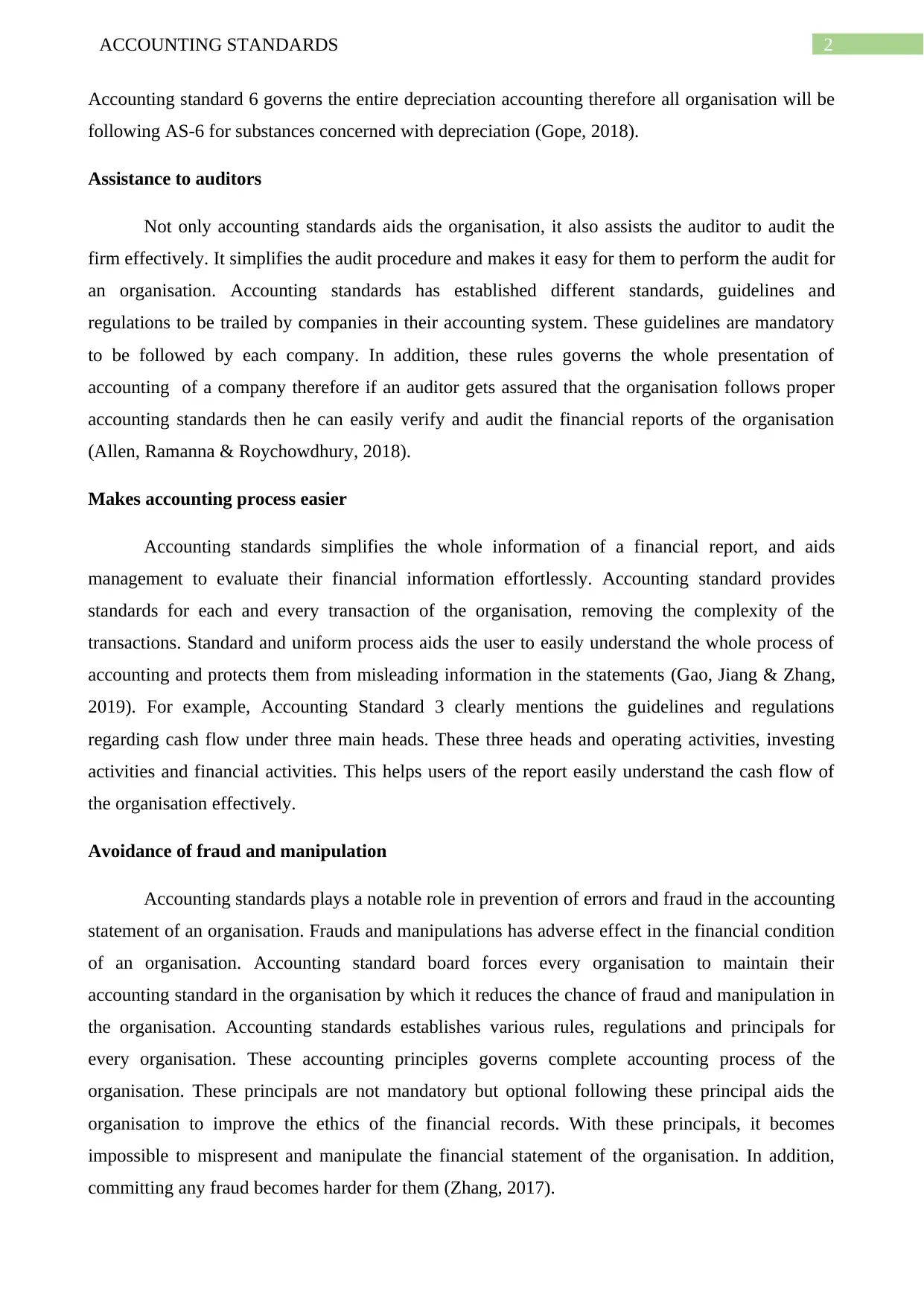
2ACCOUNTING STANDARDS
Accounting standard 6 governs the entire depreciation accounting therefore all organisation will be
following AS-6 for substances concerned with depreciation (Gope, 2018).
Assistance to auditors
Not only accounting standards aids the organisation, it also assists the auditor to audit the
firm effectively. It simplifies the audit procedure and makes it easy for them to perform the audit for
an organisation. Accounting standards has established different standards, guidelines and
regulations to be trailed by companies in their accounting system. These guidelines are mandatory
to be followed by each company. In addition, these rules governs the whole presentation of
accounting of a company therefore if an auditor gets assured that the organisation follows proper
accounting standards then he can easily verify and audit the financial reports of the organisation
(Allen, Ramanna & Roychowdhury, 2018).
Makes accounting process easier
Accounting standards simplifies the whole information of a financial report, and aids
management to evaluate their financial information effortlessly. Accounting standard provides
standards for each and every transaction of the organisation, removing the complexity of the
transactions. Standard and uniform process aids the user to easily understand the whole process of
accounting and protects them from misleading information in the statements (Gao, Jiang & Zhang,
2019). For example, Accounting Standard 3 clearly mentions the guidelines and regulations
regarding cash flow under three main heads. These three heads and operating activities, investing
activities and financial activities. This helps users of the report easily understand the cash flow of
the organisation effectively.
Avoidance of fraud and manipulation
Accounting standards plays a notable role in prevention of errors and fraud in the accounting
statement of an organisation. Frauds and manipulations has adverse effect in the financial condition
of an organisation. Accounting standard board forces every organisation to maintain their
accounting standard in the organisation by which it reduces the chance of fraud and manipulation in
the organisation. Accounting standards establishes various rules, regulations and principals for
every organisation. These accounting principles governs complete accounting process of the
organisation. These principals are not mandatory but optional following these principal aids the
organisation to improve the ethics of the financial records. With these principals, it becomes
impossible to mispresent and manipulate the financial statement of the organisation. In addition,
committing any fraud becomes harder for them (Zhang, 2017).
Accounting standard 6 governs the entire depreciation accounting therefore all organisation will be
following AS-6 for substances concerned with depreciation (Gope, 2018).
Assistance to auditors
Not only accounting standards aids the organisation, it also assists the auditor to audit the
firm effectively. It simplifies the audit procedure and makes it easy for them to perform the audit for
an organisation. Accounting standards has established different standards, guidelines and
regulations to be trailed by companies in their accounting system. These guidelines are mandatory
to be followed by each company. In addition, these rules governs the whole presentation of
accounting of a company therefore if an auditor gets assured that the organisation follows proper
accounting standards then he can easily verify and audit the financial reports of the organisation
(Allen, Ramanna & Roychowdhury, 2018).
Makes accounting process easier
Accounting standards simplifies the whole information of a financial report, and aids
management to evaluate their financial information effortlessly. Accounting standard provides
standards for each and every transaction of the organisation, removing the complexity of the
transactions. Standard and uniform process aids the user to easily understand the whole process of
accounting and protects them from misleading information in the statements (Gao, Jiang & Zhang,
2019). For example, Accounting Standard 3 clearly mentions the guidelines and regulations
regarding cash flow under three main heads. These three heads and operating activities, investing
activities and financial activities. This helps users of the report easily understand the cash flow of
the organisation effectively.
Avoidance of fraud and manipulation
Accounting standards plays a notable role in prevention of errors and fraud in the accounting
statement of an organisation. Frauds and manipulations has adverse effect in the financial condition
of an organisation. Accounting standard board forces every organisation to maintain their
accounting standard in the organisation by which it reduces the chance of fraud and manipulation in
the organisation. Accounting standards establishes various rules, regulations and principals for
every organisation. These accounting principles governs complete accounting process of the
organisation. These principals are not mandatory but optional following these principal aids the
organisation to improve the ethics of the financial records. With these principals, it becomes
impossible to mispresent and manipulate the financial statement of the organisation. In addition,
committing any fraud becomes harder for them (Zhang, 2017).
⊘ This is a preview!⊘
Do you want full access?
Subscribe today to unlock all pages.

Trusted by 1+ million students worldwide
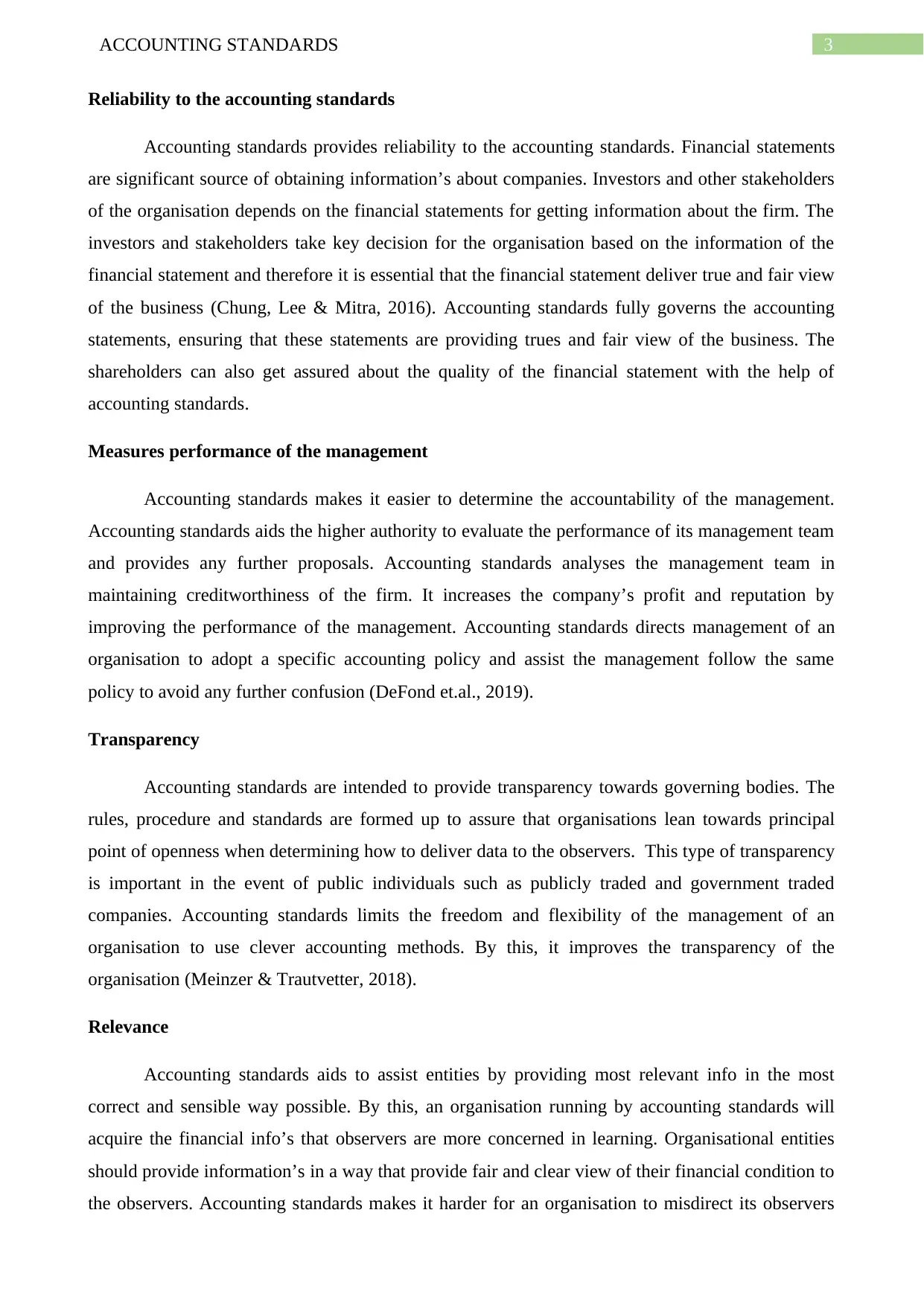
3ACCOUNTING STANDARDS
Reliability to the accounting standards
Accounting standards provides reliability to the accounting standards. Financial statements
are significant source of obtaining information’s about companies. Investors and other stakeholders
of the organisation depends on the financial statements for getting information about the firm. The
investors and stakeholders take key decision for the organisation based on the information of the
financial statement and therefore it is essential that the financial statement deliver true and fair view
of the business (Chung, Lee & Mitra, 2016). Accounting standards fully governs the accounting
statements, ensuring that these statements are providing trues and fair view of the business. The
shareholders can also get assured about the quality of the financial statement with the help of
accounting standards.
Measures performance of the management
Accounting standards makes it easier to determine the accountability of the management.
Accounting standards aids the higher authority to evaluate the performance of its management team
and provides any further proposals. Accounting standards analyses the management team in
maintaining creditworthiness of the firm. It increases the company’s profit and reputation by
improving the performance of the management. Accounting standards directs management of an
organisation to adopt a specific accounting policy and assist the management follow the same
policy to avoid any further confusion (DeFond et.al., 2019).
Transparency
Accounting standards are intended to provide transparency towards governing bodies. The
rules, procedure and standards are formed up to assure that organisations lean towards principal
point of openness when determining how to deliver data to the observers. This type of transparency
is important in the event of public individuals such as publicly traded and government traded
companies. Accounting standards limits the freedom and flexibility of the management of an
organisation to use clever accounting methods. By this, it improves the transparency of the
organisation (Meinzer & Trautvetter, 2018).
Relevance
Accounting standards aids to assist entities by providing most relevant info in the most
correct and sensible way possible. By this, an organisation running by accounting standards will
acquire the financial info’s that observers are more concerned in learning. Organisational entities
should provide information’s in a way that provide fair and clear view of their financial condition to
the observers. Accounting standards makes it harder for an organisation to misdirect its observers
Reliability to the accounting standards
Accounting standards provides reliability to the accounting standards. Financial statements
are significant source of obtaining information’s about companies. Investors and other stakeholders
of the organisation depends on the financial statements for getting information about the firm. The
investors and stakeholders take key decision for the organisation based on the information of the
financial statement and therefore it is essential that the financial statement deliver true and fair view
of the business (Chung, Lee & Mitra, 2016). Accounting standards fully governs the accounting
statements, ensuring that these statements are providing trues and fair view of the business. The
shareholders can also get assured about the quality of the financial statement with the help of
accounting standards.
Measures performance of the management
Accounting standards makes it easier to determine the accountability of the management.
Accounting standards aids the higher authority to evaluate the performance of its management team
and provides any further proposals. Accounting standards analyses the management team in
maintaining creditworthiness of the firm. It increases the company’s profit and reputation by
improving the performance of the management. Accounting standards directs management of an
organisation to adopt a specific accounting policy and assist the management follow the same
policy to avoid any further confusion (DeFond et.al., 2019).
Transparency
Accounting standards are intended to provide transparency towards governing bodies. The
rules, procedure and standards are formed up to assure that organisations lean towards principal
point of openness when determining how to deliver data to the observers. This type of transparency
is important in the event of public individuals such as publicly traded and government traded
companies. Accounting standards limits the freedom and flexibility of the management of an
organisation to use clever accounting methods. By this, it improves the transparency of the
organisation (Meinzer & Trautvetter, 2018).
Relevance
Accounting standards aids to assist entities by providing most relevant info in the most
correct and sensible way possible. By this, an organisation running by accounting standards will
acquire the financial info’s that observers are more concerned in learning. Organisational entities
should provide information’s in a way that provide fair and clear view of their financial condition to
the observers. Accounting standards makes it harder for an organisation to misdirect its observers
Paraphrase This Document
Need a fresh take? Get an instant paraphrase of this document with our AI Paraphraser
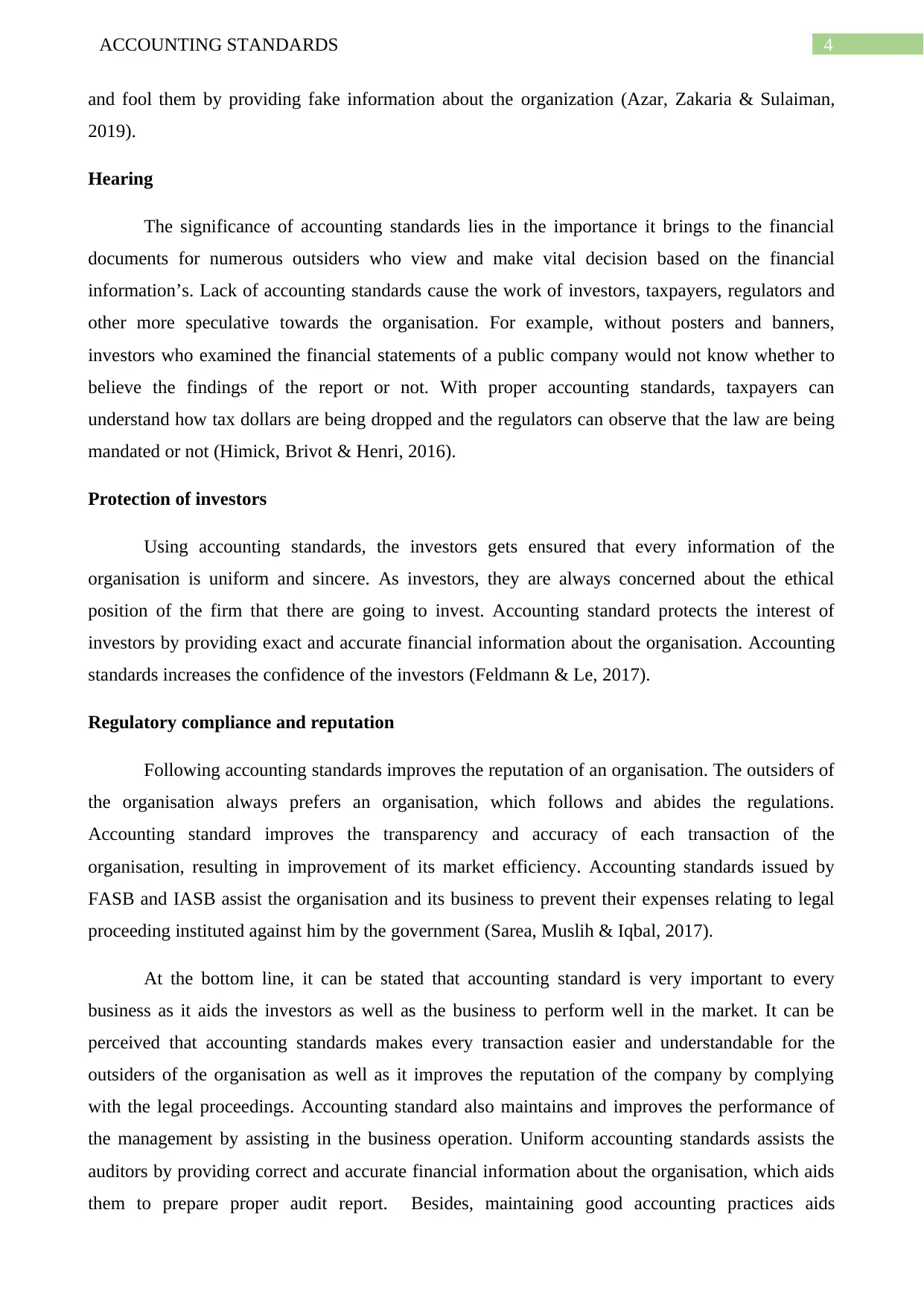
4ACCOUNTING STANDARDS
and fool them by providing fake information about the organization (Azar, Zakaria & Sulaiman,
2019).
Hearing
The significance of accounting standards lies in the importance it brings to the financial
documents for numerous outsiders who view and make vital decision based on the financial
information’s. Lack of accounting standards cause the work of investors, taxpayers, regulators and
other more speculative towards the organisation. For example, without posters and banners,
investors who examined the financial statements of a public company would not know whether to
believe the findings of the report or not. With proper accounting standards, taxpayers can
understand how tax dollars are being dropped and the regulators can observe that the law are being
mandated or not (Himick, Brivot & Henri, 2016).
Protection of investors
Using accounting standards, the investors gets ensured that every information of the
organisation is uniform and sincere. As investors, they are always concerned about the ethical
position of the firm that there are going to invest. Accounting standard protects the interest of
investors by providing exact and accurate financial information about the organisation. Accounting
standards increases the confidence of the investors (Feldmann & Le, 2017).
Regulatory compliance and reputation
Following accounting standards improves the reputation of an organisation. The outsiders of
the organisation always prefers an organisation, which follows and abides the regulations.
Accounting standard improves the transparency and accuracy of each transaction of the
organisation, resulting in improvement of its market efficiency. Accounting standards issued by
FASB and IASB assist the organisation and its business to prevent their expenses relating to legal
proceeding instituted against him by the government (Sarea, Muslih & Iqbal, 2017).
At the bottom line, it can be stated that accounting standard is very important to every
business as it aids the investors as well as the business to perform well in the market. It can be
perceived that accounting standards makes every transaction easier and understandable for the
outsiders of the organisation as well as it improves the reputation of the company by complying
with the legal proceedings. Accounting standard also maintains and improves the performance of
the management by assisting in the business operation. Uniform accounting standards assists the
auditors by providing correct and accurate financial information about the organisation, which aids
them to prepare proper audit report. Besides, maintaining good accounting practices aids
and fool them by providing fake information about the organization (Azar, Zakaria & Sulaiman,
2019).
Hearing
The significance of accounting standards lies in the importance it brings to the financial
documents for numerous outsiders who view and make vital decision based on the financial
information’s. Lack of accounting standards cause the work of investors, taxpayers, regulators and
other more speculative towards the organisation. For example, without posters and banners,
investors who examined the financial statements of a public company would not know whether to
believe the findings of the report or not. With proper accounting standards, taxpayers can
understand how tax dollars are being dropped and the regulators can observe that the law are being
mandated or not (Himick, Brivot & Henri, 2016).
Protection of investors
Using accounting standards, the investors gets ensured that every information of the
organisation is uniform and sincere. As investors, they are always concerned about the ethical
position of the firm that there are going to invest. Accounting standard protects the interest of
investors by providing exact and accurate financial information about the organisation. Accounting
standards increases the confidence of the investors (Feldmann & Le, 2017).
Regulatory compliance and reputation
Following accounting standards improves the reputation of an organisation. The outsiders of
the organisation always prefers an organisation, which follows and abides the regulations.
Accounting standard improves the transparency and accuracy of each transaction of the
organisation, resulting in improvement of its market efficiency. Accounting standards issued by
FASB and IASB assist the organisation and its business to prevent their expenses relating to legal
proceeding instituted against him by the government (Sarea, Muslih & Iqbal, 2017).
At the bottom line, it can be stated that accounting standard is very important to every
business as it aids the investors as well as the business to perform well in the market. It can be
perceived that accounting standards makes every transaction easier and understandable for the
outsiders of the organisation as well as it improves the reputation of the company by complying
with the legal proceedings. Accounting standard also maintains and improves the performance of
the management by assisting in the business operation. Uniform accounting standards assists the
auditors by providing correct and accurate financial information about the organisation, which aids
them to prepare proper audit report. Besides, maintaining good accounting practices aids
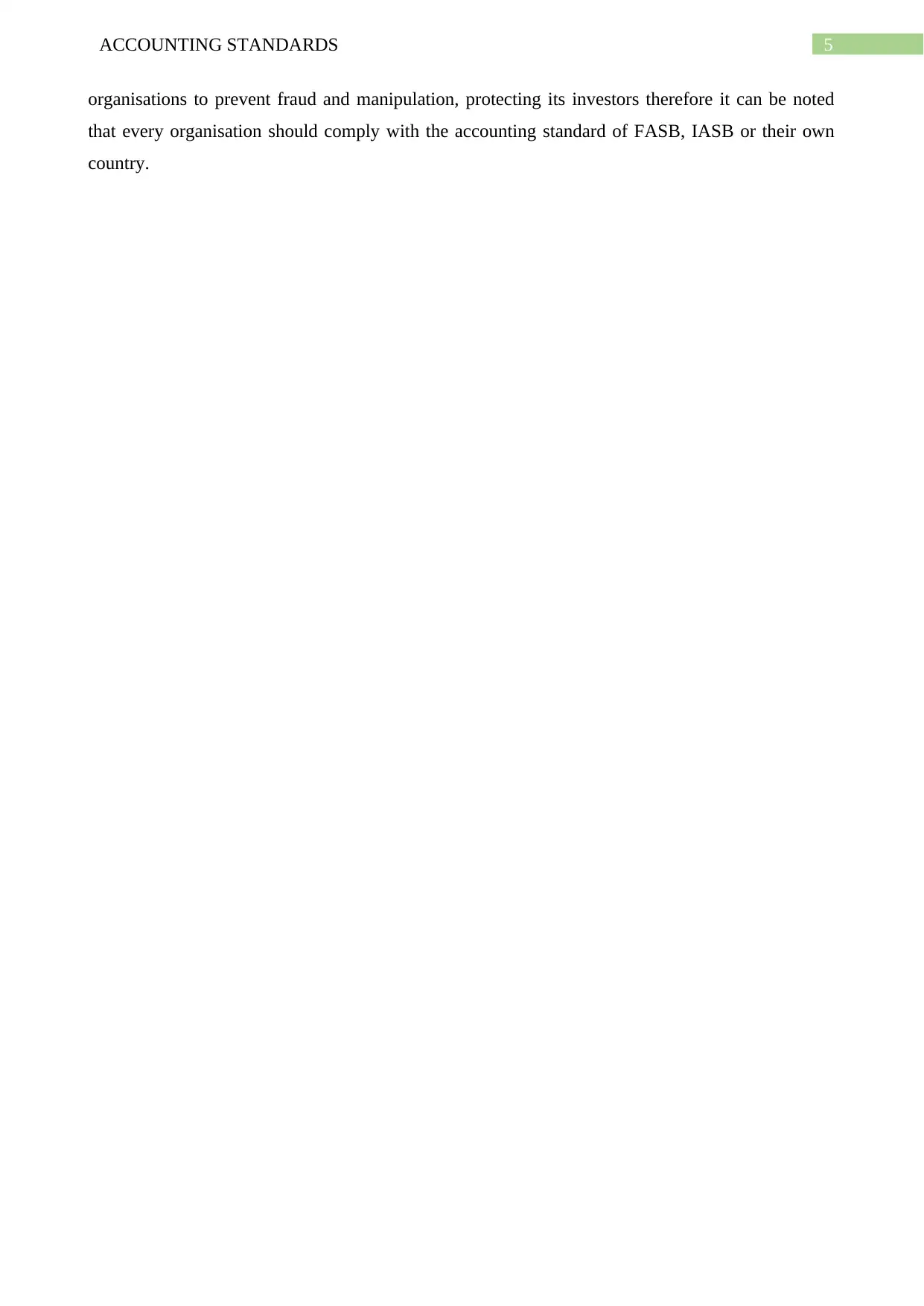
5ACCOUNTING STANDARDS
organisations to prevent fraud and manipulation, protecting its investors therefore it can be noted
that every organisation should comply with the accounting standard of FASB, IASB or their own
country.
organisations to prevent fraud and manipulation, protecting its investors therefore it can be noted
that every organisation should comply with the accounting standard of FASB, IASB or their own
country.
⊘ This is a preview!⊘
Do you want full access?
Subscribe today to unlock all pages.

Trusted by 1+ million students worldwide
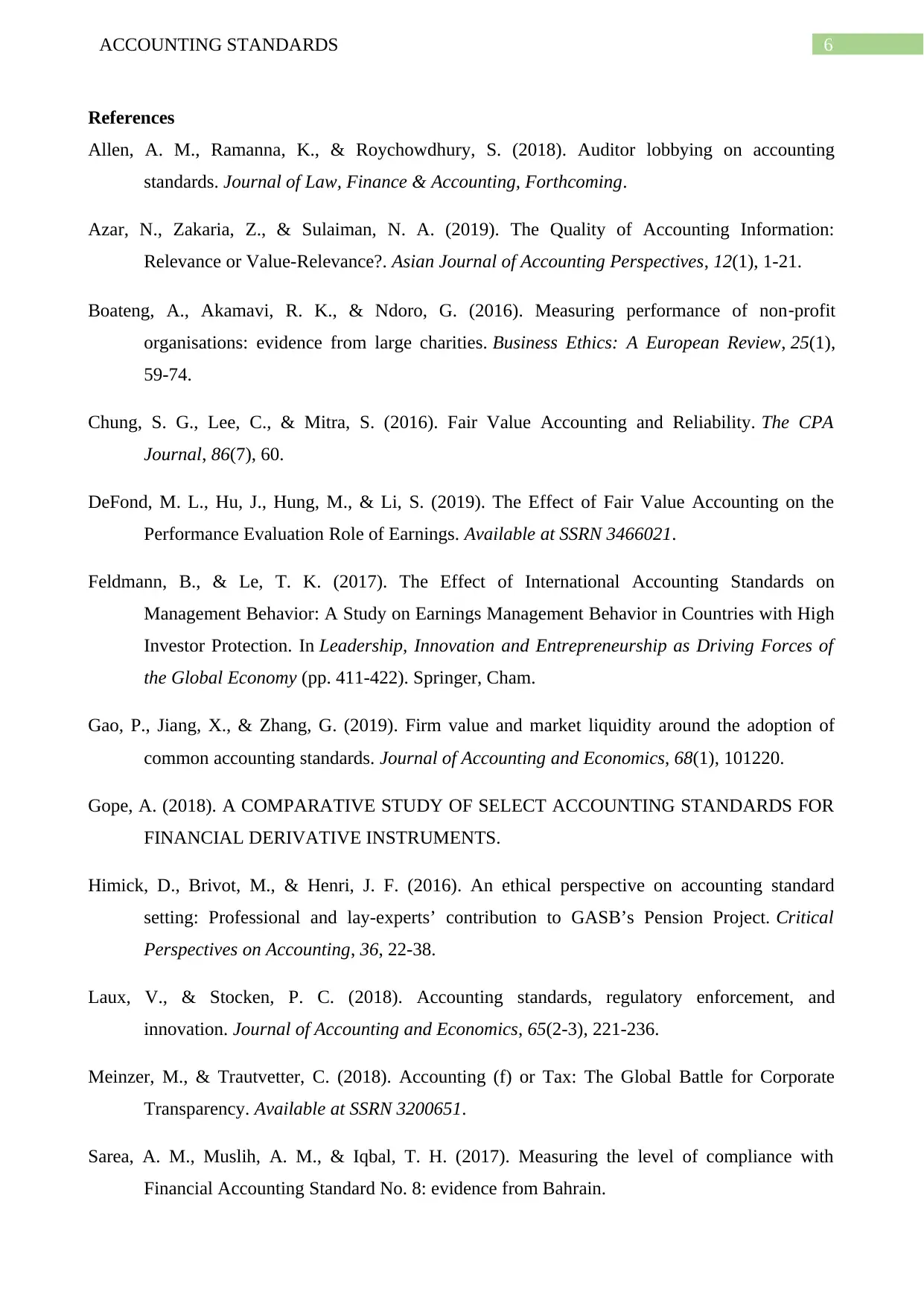
6ACCOUNTING STANDARDS
References
Allen, A. M., Ramanna, K., & Roychowdhury, S. (2018). Auditor lobbying on accounting
standards. Journal of Law, Finance & Accounting, Forthcoming.
Azar, N., Zakaria, Z., & Sulaiman, N. A. (2019). The Quality of Accounting Information:
Relevance or Value-Relevance?. Asian Journal of Accounting Perspectives, 12(1), 1-21.
Boateng, A., Akamavi, R. K., & Ndoro, G. (2016). Measuring performance of non‐profit
organisations: evidence from large charities. Business Ethics: A European Review, 25(1),
59-74.
Chung, S. G., Lee, C., & Mitra, S. (2016). Fair Value Accounting and Reliability. The CPA
Journal, 86(7), 60.
DeFond, M. L., Hu, J., Hung, M., & Li, S. (2019). The Effect of Fair Value Accounting on the
Performance Evaluation Role of Earnings. Available at SSRN 3466021.
Feldmann, B., & Le, T. K. (2017). The Effect of International Accounting Standards on
Management Behavior: A Study on Earnings Management Behavior in Countries with High
Investor Protection. In Leadership, Innovation and Entrepreneurship as Driving Forces of
the Global Economy (pp. 411-422). Springer, Cham.
Gao, P., Jiang, X., & Zhang, G. (2019). Firm value and market liquidity around the adoption of
common accounting standards. Journal of Accounting and Economics, 68(1), 101220.
Gope, A. (2018). A COMPARATIVE STUDY OF SELECT ACCOUNTING STANDARDS FOR
FINANCIAL DERIVATIVE INSTRUMENTS.
Himick, D., Brivot, M., & Henri, J. F. (2016). An ethical perspective on accounting standard
setting: Professional and lay-experts’ contribution to GASB’s Pension Project. Critical
Perspectives on Accounting, 36, 22-38.
Laux, V., & Stocken, P. C. (2018). Accounting standards, regulatory enforcement, and
innovation. Journal of Accounting and Economics, 65(2-3), 221-236.
Meinzer, M., & Trautvetter, C. (2018). Accounting (f) or Tax: The Global Battle for Corporate
Transparency. Available at SSRN 3200651.
Sarea, A. M., Muslih, A. M., & Iqbal, T. H. (2017). Measuring the level of compliance with
Financial Accounting Standard No. 8: evidence from Bahrain.
References
Allen, A. M., Ramanna, K., & Roychowdhury, S. (2018). Auditor lobbying on accounting
standards. Journal of Law, Finance & Accounting, Forthcoming.
Azar, N., Zakaria, Z., & Sulaiman, N. A. (2019). The Quality of Accounting Information:
Relevance or Value-Relevance?. Asian Journal of Accounting Perspectives, 12(1), 1-21.
Boateng, A., Akamavi, R. K., & Ndoro, G. (2016). Measuring performance of non‐profit
organisations: evidence from large charities. Business Ethics: A European Review, 25(1),
59-74.
Chung, S. G., Lee, C., & Mitra, S. (2016). Fair Value Accounting and Reliability. The CPA
Journal, 86(7), 60.
DeFond, M. L., Hu, J., Hung, M., & Li, S. (2019). The Effect of Fair Value Accounting on the
Performance Evaluation Role of Earnings. Available at SSRN 3466021.
Feldmann, B., & Le, T. K. (2017). The Effect of International Accounting Standards on
Management Behavior: A Study on Earnings Management Behavior in Countries with High
Investor Protection. In Leadership, Innovation and Entrepreneurship as Driving Forces of
the Global Economy (pp. 411-422). Springer, Cham.
Gao, P., Jiang, X., & Zhang, G. (2019). Firm value and market liquidity around the adoption of
common accounting standards. Journal of Accounting and Economics, 68(1), 101220.
Gope, A. (2018). A COMPARATIVE STUDY OF SELECT ACCOUNTING STANDARDS FOR
FINANCIAL DERIVATIVE INSTRUMENTS.
Himick, D., Brivot, M., & Henri, J. F. (2016). An ethical perspective on accounting standard
setting: Professional and lay-experts’ contribution to GASB’s Pension Project. Critical
Perspectives on Accounting, 36, 22-38.
Laux, V., & Stocken, P. C. (2018). Accounting standards, regulatory enforcement, and
innovation. Journal of Accounting and Economics, 65(2-3), 221-236.
Meinzer, M., & Trautvetter, C. (2018). Accounting (f) or Tax: The Global Battle for Corporate
Transparency. Available at SSRN 3200651.
Sarea, A. M., Muslih, A. M., & Iqbal, T. H. (2017). Measuring the level of compliance with
Financial Accounting Standard No. 8: evidence from Bahrain.
Paraphrase This Document
Need a fresh take? Get an instant paraphrase of this document with our AI Paraphraser
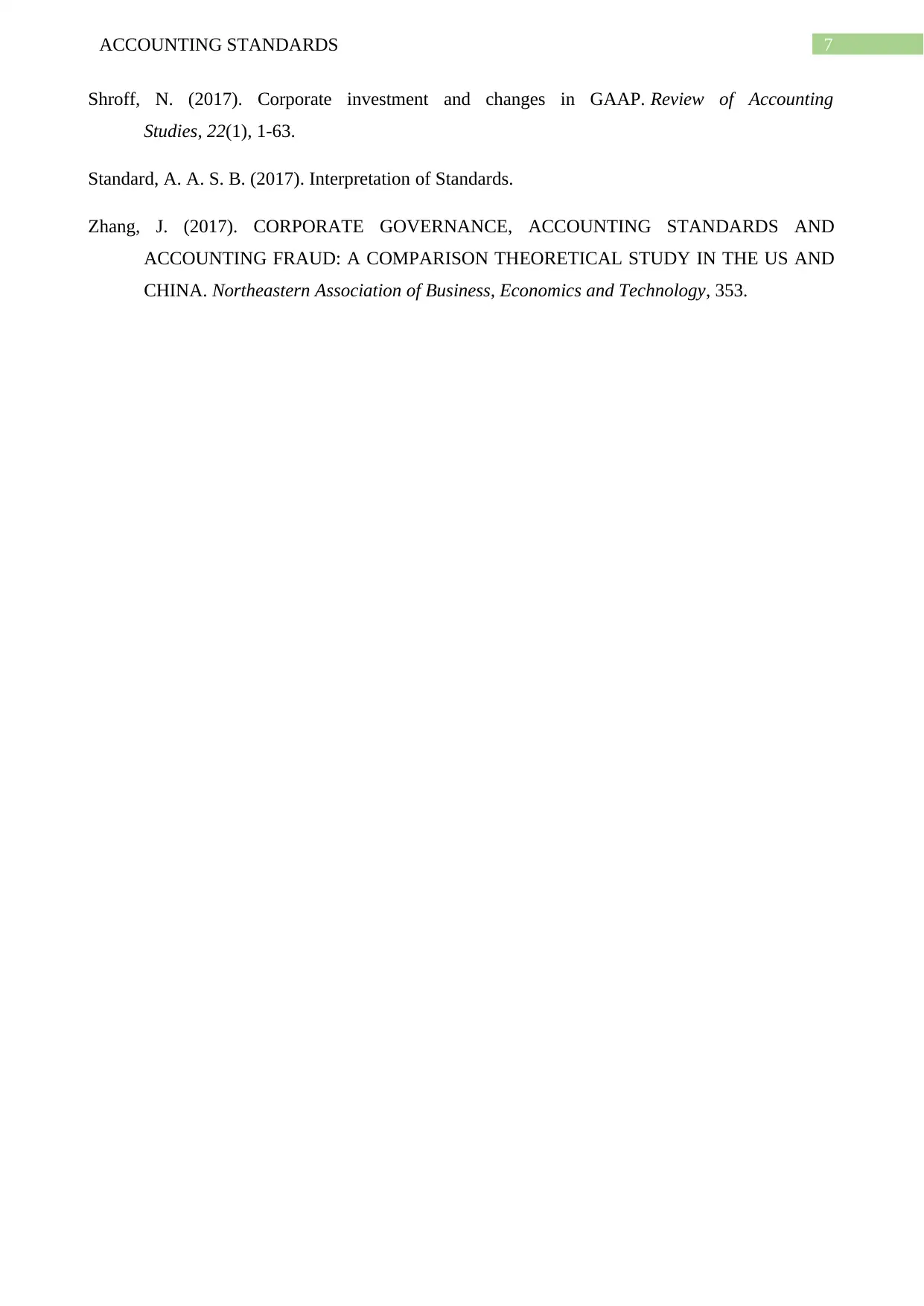
7ACCOUNTING STANDARDS
Shroff, N. (2017). Corporate investment and changes in GAAP. Review of Accounting
Studies, 22(1), 1-63.
Standard, A. A. S. B. (2017). Interpretation of Standards.
Zhang, J. (2017). CORPORATE GOVERNANCE, ACCOUNTING STANDARDS AND
ACCOUNTING FRAUD: A COMPARISON THEORETICAL STUDY IN THE US AND
CHINA. Northeastern Association of Business, Economics and Technology, 353.
Shroff, N. (2017). Corporate investment and changes in GAAP. Review of Accounting
Studies, 22(1), 1-63.
Standard, A. A. S. B. (2017). Interpretation of Standards.
Zhang, J. (2017). CORPORATE GOVERNANCE, ACCOUNTING STANDARDS AND
ACCOUNTING FRAUD: A COMPARISON THEORETICAL STUDY IN THE US AND
CHINA. Northeastern Association of Business, Economics and Technology, 353.
1 out of 8
Related Documents
Your All-in-One AI-Powered Toolkit for Academic Success.
+13062052269
info@desklib.com
Available 24*7 on WhatsApp / Email
![[object Object]](/_next/static/media/star-bottom.7253800d.svg)
Unlock your academic potential
Copyright © 2020–2026 A2Z Services. All Rights Reserved. Developed and managed by ZUCOL.





